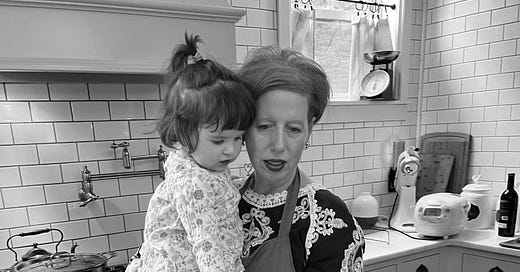Rethinking the "F" Word
I've always chosen not to describe myself as a feminist. But perhaps the time has come to choose differently.
Sorry this month’s essay is a day late. We’ve had a rough week of toddler sleep, and I am just getting too old to force myself out of bed at 4 am to write, after being up for hours with a restless or crying little one. I figured you would understand.
Also, as a quick reminder, if you still want to order signed copies of my books for Easter baskets, you have through tomorrow night (Sunday, March 30), to get your order in. All books will ship by Tuesday, April 1, and should arrive in time for Easter. Thanks so much to all of you who have shopped directly with me this month!
Now, for the essay (audio version can be found at the end).
I get called a feminist quite a lot these days. It’s always used as an insult, never a compliment, and frequently paired with the words “liberal” and “modernist.”
I always find this funny. Sometimes in a “ha-ha” kind of way. But, far more often, in a “this is completely bizarre” kind of way.
It is, after all, a bit puzzling how one gets labeled a “liberal, modernist feminist” after spending decades publicly defending the Church’s teachings—not just the “easy” ones, like the Eucharist or the Trinity, but also the more personally challenging and culturally unpopular ones, like those about sex and marriage.
Occasionally, I suspect my newfound monikers have something to do with my pixie cut (which my husband prefers, btw). Or possibly the pants I wear in the winter (it’s cold in this house, people!). I also attend a Novus Ordo parish (a very liturgically traditional one, mind you, but still). And of course, I write for money … without pretending that the work I do is just “my little side hustle” and not what it actually is: a substantial means of support for my family.
Then, to top it all off, there’s my continued insistence that women are rational creatures, made in the image of God, as capable of exercising free will as wisely as any man, and not objects for male domination, use, and control. In other words, I believe what the Catholic Church teaches. I take her and her popes and her doctrines seriously.
This is nothing new for me, though. I’ve been writing about the Church’s teachings on women for as long as I’ve been a public Catholic—so, for almost 25 years now. And up until recently, my writings on women more often led people to label me “conservative,” “old fashioned,” and “traditional.” Until a couple years ago, no one ever called me a feminist, including myself.
But times have changed. They’ve gotten a lot more confusing for a lot more people. And in the midst of that confusion, strong voices have emerged, strong voices which promise clarity, but ultimately produce only more confusion.
This is particularly true when it comes to questions of women, marriage, and family. I’ve written at length about those strong, confusing voices before (see examples A, B, C, and D), and I suspect those essays, more than anything else, are why so many people on the Interwebs have taken to calling me a feminist.
It is disorienting. And I admit, the longer it goes on, the more I’m beginning to wonder if maybe I shouldn’t just lean into it and own it. As Abigail Favale said to Matt Fradd in their conversation on Pints with Aquinas in 2022, there’s something about the recent attacks on women’s dignity from the fundamentalist Manosphere that makes one want to dust off that feminist label and take it up once more (or, in my case, for the first time.) Which is to say, the Manosphere is tempting me to do something that even Pope Saint John Paul II couldn’t get me to do: call myself a feminist.
Keep reading with a 7-day free trial
Subscribe to Through a Glass Darkly to keep reading this post and get 7 days of free access to the full post archives.




